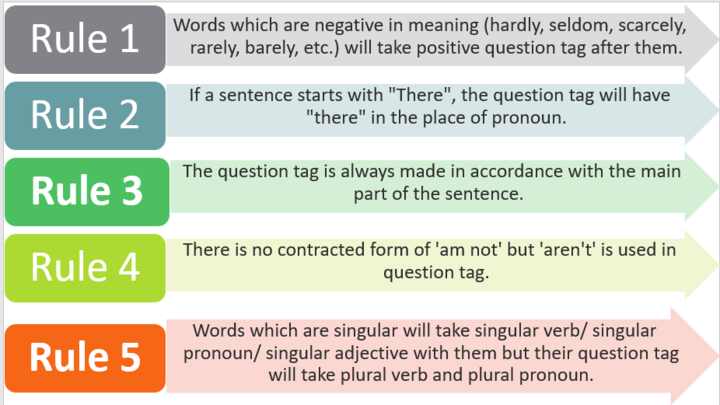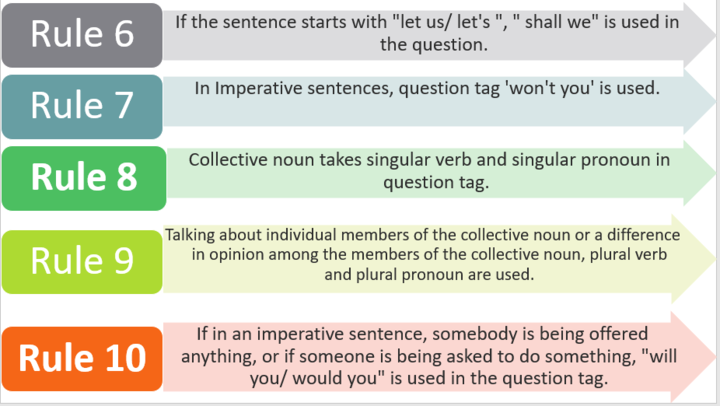Study Notes on Rules of Question Tags in English Grammar: SSC Stenographer, SSC GD Constable, SSC CGL Tier 2 Exams 2020-21 are around the corner. Question tag is very important topic asked frequently in all SSC and Banking exams. This may be easy for some of you while difficult for others. So, let us make it easy for all of you through these Rules of Question Tag in English Grammar which will make these questions very easy for you to answer. There are some rules from where questions are quite frequently asked. In this blog we have complied all the important rules with their examples to help you with your preparation. We hope the post will be helpful for the upcoming SSC & other Competitive Exams.
Study Notes on Rules of Question Tags in English Grammar: SSC Stenographer, SSC GD Constable, SSC CGL Tier 2 Exams 2020-21 are around the corner. Question tag is very important topic asked frequently in all SSC and Banking exams. This may be easy for some of you while difficult for others. So, let us make it easy for all of you through these Rules of Question Tag in English Grammar which will make these questions very easy for you to answer. There are some rules from where questions are quite frequently asked. In this blog we have complied all the important rules with their examples to help you with your preparation. We hope the post will be helpful for the upcoming SSC & other Competitive Exams.
Rules of Question Tags in English Grammar
What Are Question Tags?
Tag questions (also known as question tags) convert a statement into a question. They are frequently employed to verify information that we believe to be correct.
Tag questions are formed by combining an auxiliary verb (such as be or have) and a subject pronoun (for example: I, you, she). Negative question tags are often contracted as follows: Isn't it warm today (not 'isn't it')?
If the main clause is positive, the question tag is usually negative, and if the main clause is negative, the question tag is positive.
Basic Points To Remember
- The sentence and the question tag must be in the same tense.
- For negative question tag, use the Contracted form of 'helping verb' and 'not' .E.g didn't, hadn't, won't, etc
- If the Sentence is positive, the question tag must be negative and vice versa.
- Always use pronouns in the question tag.

Rule-1: Some words are negative in meaning. For e.g. hardly, seldom, scarcely, rarely, barely, etc. Hence they will take positive question tags after them.
- E.g.- He hardly does any work, does he?
- He found barely anything to eat, did he?
- He is seldom absent, is he?
Rule-2: If a sentence starts with "There", the question tag will have "there" in the place of pronoun.
- E.g- There is no water, is there?
- There were no good schools in the town, were there?
Rule-3: The question tag is always made in accordance with the main part of the sentence.
- E.g- I think, he is right, isn't he? (Here 'I think' is not important and hence it is not the main part of the sentence".
Rule- 4: There is no contracted form of 'am not' but 'aren't' is used in the question tag.
- Eg- I am fine, aren't I?
Rule-5: Each, every, everyone, everybody, no one, nobody, none are singular and hence will take singular verb/ singular pronoun/ singular adjective with them but their question tag will take plural verb and plural pronoun.
- E.g- Everyone has come, hasn't he ( Incorrect)
- Everyone has come, haven't they (correct)
- None of your friends like her, do they
- Everyone can speak English, can't they?

Rule-6: If the sentence starts with "let us/ let's ", " shall we" is used in the question.
- E.g.- Let us go to a party tonight, shall we?
Rule-7: In Imperative sentences, question tag 'won't you' is used.
- E.g- come in, won't you?
Rule-8: Collective noun takes a singular verb and singular pronoun in the question tag.
- E.g.- The jury has taken its decision, hasn't it?
Rule-9: If we talk about the individual members of the collective noun or if there is a difference in opinion among the members of the collective noun, plural verb and plural pronoun are used.
- E.g.- The comm are divided in their opinion, aren't they?
- The audience have taken their seats, haven't they?
Rule-10: If in an imperative sentence, somebody is being offered anything, or if someone is being asked to do something, "will you/ would you" is used in the question tag.
- E.g- Open the door, would you?
- Have some more tea, would you?


